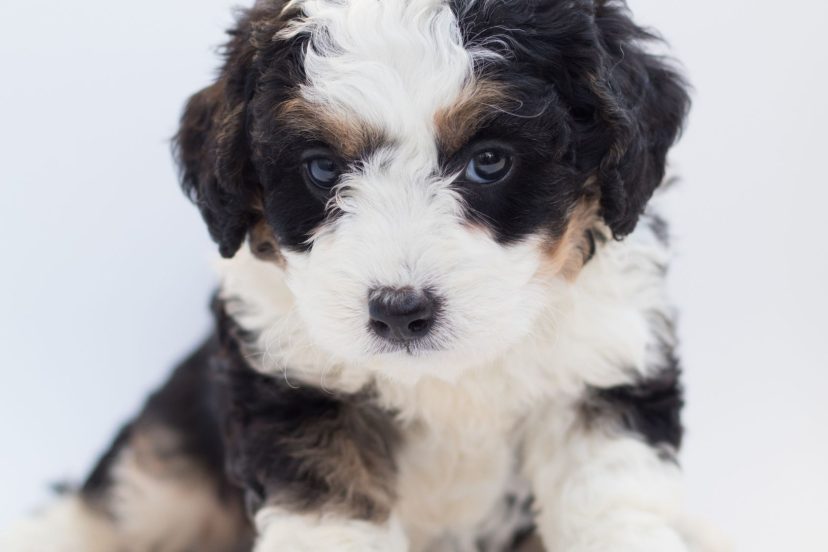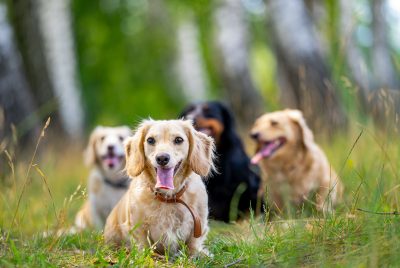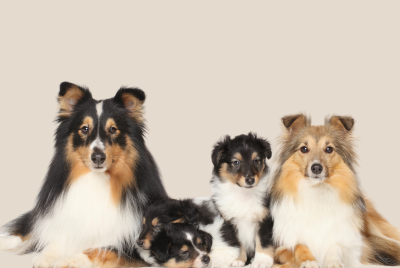Bernedoodle Puppies You’ll Want to Hug Through Screen!
The bernedoodle is a new dog mix that many people like. It mixes a Bernese Mountain Dog and a Poodle. Breeders want to make a loyal, fun, and kind pet by mixing the best of both dogs.
Bernedoodle puppies are cute and grow into smart, fun, and sweet dogs. They spend about 8 weeks with their mom before going to new homes. This time needs good care, teaching, and help from pet owners.
In this guide, we’ll talk about all things about bernedoodle pups. This includes their past, looks, ways, training, health, food, and how to find a good breeder. If you want to add one of these pups to your home or just want to learn more, keep reading for all about bernedoodle puppies.
History of the Bernedoodle Puppies
The bernedoodle is still a new hybrid dog, first bred in the early 2000s. The exact origins are unclear but it’s believed the early crosses happened in North America, likely in Canada. The goal was to blend the friendly, loyal temperament of the Bernese Mountain Dog with the intelligence and low-shedding coat of the Poodle.
Both parent breeds have long histories – the Bernese Mountain Dog originated as a farm dog in the Swiss Alps while Poodles were bred as hunting water retrievers. The bernedoodle has risen in popularity due to their affectionate nature and moderate energy level, making them a versatile family companion. As the breed continues to gain fans, responsible breeders work to achieve healthy and consistent hybrids.
Bernedoodle Puppy Appearance
One of the most appealing traits of bernedoodle puppies is their adorable fluffy appearance. They usually have a soft, woolly coat that may be wavy or curly. Since bernedoodles are hybrids, their appearance can vary greatly depending on which parent they take after. In general, bernedoodle puppies have a stocky, strong build.
They have slightly rounded skulls with a black nose and dark, almond-shaped eyes. Their ears hang down beside the face. The tail is bushy and may curl slightly over the back. Common coat colors include black, brown, white, and merle (a mottled pattern).
Bernedoodles may also have black masks or white markings on the chest and/or paws. Their coat can be a mix of solid and multi colors. Bernedoodle puppies usually weigh 5 to 10 pounds at 8 weeks old.
As adults, standard bernedoodles reach 49 to 70 pounds and 22 to 29 inches tall while mini bernedoodles weigh 15 to 30 pounds and reach 16 to 18 inches.
Grooming Needs
One of the appeals of bernedoodles is they tend to shed less than Bernese Mountain Dogs thanks to the Poodle’s low-shedding coat. However, bernedoodle puppies have moderate to high grooming needs. Their thick coat must be brushed two to three times a week to prevent matting.
Many bernedoodle owners choose to have their dog’s coat clipped short every six to eight weeks to simplify grooming. Ask your groomer for a “teddy bear” clip that leaves the face and legs fluffy. Bernedoodle puppies should be introduced to brushing and handling early on to get them used to grooming.
Bathe your bernedoodle puppy once every one to two months using a gentle dog shampoo. Check and clean their ears weekly since floppy ears are prone to buildup and infection. Brush their teeth several times per week and trim nails as needed.
Ideal Temperament and Behavior
The typical bernedoodle temperament is a key reason these hybrids make great family pets. Bernedoodles are affectionate, playful, gentle, loyal, and eager to please. They form extremely strong bonds with their owners. Since poodles are smart and energetic while Bernese Mountain Dogs are more laidback, bernedoodles can have a range of activity levels.
But most thrive when they get daily exercise and plenty of time with their family. Proper socialization and training from a young age is essential for any puppy, including bernedoodles. Expose your bernedoodle puppy to a wide variety of people, places, animals, sights and sounds during their first 16 weeks.
Sign them up for puppy kindergarten around 10-12 weeks old for early obedience training and socialization. Bernedoodles are highly intelligent so they need lots of mental stimulation through play, training, and puzzles.
Without enough activity, they may become bored and destructive. Bernedoodles make excellent therapy dogs due to their affectionate and gentle nature.
Ideal Environment
While bernedoodles adapt well to any home, they prefer to be close to their family. Apartments and small homes are fine as long as the dog gets outside several times a day. Expect your bernedoodle puppy to shadow you everywhere in the house! Bernedoodles handle cold climates better than heat due to their thick coat.
Make sure your puppy has access to shade and fresh water if spending time outdoors in warm weather. Bernedoodles love activities like hiking, swimming, playing fetch, and learning new tricks.
Since this breed bonds very closely with family, they may experience separation anxiety if left alone for long periods. Crate training your puppy helps them see their crate as a safe space when you can’t supervise them. Providing interactive toys also keeps them engaged when alone.
Ideal Diet and Nutrition
Like all puppies, bernedoodle puppies need a complete and balanced diet to support their rapid growth and development. It’s best to feed them a high-quality puppy kibble formulated specifically for large or giant breeds.
Feed your bernedoodle puppy three scheduled meals per day until around 6 months old when you can transition to two meals daily. Follow portion sizes according to their projected adult weight. Feed your puppy in a quiet area without distractions to help prevent overeating.
Avoid free feeding puppy food available at all times, as this makes it harder to monitor how much they eat. Limit treats to 10% of daily calories and use small pieces for training rewards. Provide a constant supply of fresh water. Ask your vet if you have any questions about your puppy’s diet.
Exercise Needs
Bernedoodle puppies have lots of energy and need at least 60 minutes of exercise and playtime every day. Take them for short, frequent walks around your neighborhood to start leash training early. Allow free play in a securely fenced yard under supervision.
As your puppy grows, you can gradually increase the length and difficulty of walks. Incorporate fun activities like retrieving balls or flying discs, agility equipment, and swimming. Bernedoodles also love hiking and jogging with their owners once fully grown around 12-18 months old.
Mental stimulation through training sessions and interactive puzzle toys is equally important. Plan to enroll your bernedoodle in obedience classes starting at 10-12 weeks old for socialization and basic commands. Practice training daily in short sessions using positive reinforcement techniques.
If your bernedoodle puppy ever seems sluggish or unwilling to play, contact your vet since this can indicate an underlying health issue requiring prompt attention. Providing adequate exercise helps avoid problem behaviors caused by boredom and excess energy.
Training Tips
The key to successfully training a bernedoodle puppy is understanding their high intelligence and eagerness to please. Bernedoodles respond extremely well to positive reinforcement training methods using food rewards and praise. Start with basic commands like “sit”, “stay”, “come”, “down” and “heel”.
Use a reward marker like a clicker whenever your puppy correctly responds to a command before giving the treat. This helps them understand the exact behavior that earned the reward. Aim for short, frequent training sessions to hold your puppy’s interest. Their attention span is very limited at first.
Gradually shape more complex behaviors by rewarding small steps toward the goal. Be patient and keep sessions upbeat and fun. Socialization is another critical part of bernedoodle puppy training.
Introduce them to a wide variety of people, animals, places, sights and sounds in a positive way during the critical socialization window before 16 weeks old. Sign up for puppy kindergarten as soon as your vet approves. Crate training utilizes a dog’s natural den instincts to create a safe place for them to relax and sleep.
It also teaches bladder control since most dogs won’t soil their crate. Reward your puppy for calmly spending short periods in their crate, gradually increasing the time as they grow.

Common Health Issues
Reputable bernedoodle breeders aim to produce healthy puppies by carefully screening their breeding dogs for inherited diseases common in Bernese Mountain Dogs and Poodles. However, some issues may still occur.
Hip and Elbow Dysplasia: Malformation of these joints that can lead to osteoarthritis. Have your vet screen for this.
Skin Problems: Allergies and hot spots may affect the skin and ears. Keep their coat clean and dry.
Eye Issues: Cataracts, progressive retinal atrophy, and cherry eye are possible. Monitor their eyes.
Gastric Dilatation Volvulus: Life-threatening twisting of the stomach requires emergency surgery. Limit exercise and stress after eating.
Seizures: May develop idiopathic epilepsy. Discuss medication options with your vet.
Cancer: Bernese Mountain Dogs have higher cancer rates that may be passed down. Routine vet exams help detect early. Careful breeding minimizes the chances of puppies inheriting serious genetic issues.
Discuss health screening with your breeder and follow your vet’s advice about preventive care. Pet insurance can also offset costs if issues arise.
Finding a Reputable Breeder
Since bernedoodles are a relatively new hybrid breed, finding a responsible breeder is crucial to getting a happy and healthy puppy. Avoid pet stores or breeders who can’t provide proof of health testing. Look for breeders who carefully screen their breeding dogs for hereditary issues and only breed dogs with sound temperaments.
They should provide health clearances like hip evaluations and eye exams. The breeder’s facility should be clean with plenty of room for puppies to play and interact with their mother and littermates until they go home. Puppies should stay with their mom for at least 8 weeks.
Ask to meet the puppy’s parents if possible to get an idea of the puppy’s expected size and temperament. Responsible breeders also stand behind their puppies with a health guarantee.
Be prepared to wait – reputable breeders often have long waitlists. But it’s worth the wait to get a happy, healthy bernedoodle puppy who will bring joy to your life for years to come!
Conclusion
It’s easy to see why Bernedoodle puppies have become such popular hybrid dogs in the past twenty years – from their teddy bear appearance to their loyal and friendly nature. They are good pets for energetic families who can train them and exercise them daily.
However, Bernedoodle puppies are time-consuming, laborious and expensive. Regular grooming is required for their thick fur and they should be placed in obedience classes starting at ten-twelve weeks of age.
This will prevent destructive behavior. Find out about dog health testing breeders that breed with stable temperaments.
Get ready to bring an exciting new bundle of joy into your home! Properly attended to, Bernedoodles make loyal loving companions that enrich life and make it more fulfilling.




